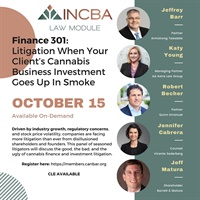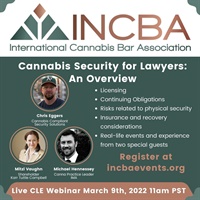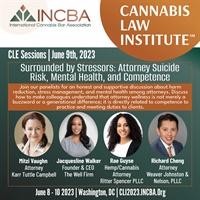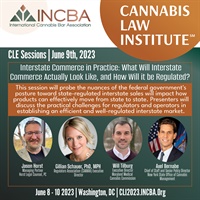Before you Buy: Check the Credit Tab to Make Sure Your Jurisdiction is Accredited!

- Average Rating:
- 6
- Categories:
- Federal Law | Regulation law
- Faculty:
- Andrea Steel | Eliyahu Scheiman, J.D. | Rob DiPisa | Eric D Postow
- Duration:
- 1 Hour 2 Minutes
- Format:
- Audio and Video
- SKU:
- INCBA05122021OD
- License:
- Short Description:
- Those already in the cannabis industry and those looking to get into it will get a chance to learn more about newest adult-use markets in the country, how they compare to one another, and what we can anticipate as these new opportunities take shape.
- Price:
- $30.00 - $75.00

- Average Rating:
- 9
- Categories:
- International Webinar | Business | International Law | IP law | Medical/Healthcare/Access | Regulation law | Webinar with CLE credit
- Faculty:
- Niall Neligan
- Duration:
- 1 Hour 2 Minutes
- Format:
- Audio and Video
- SKU:
- INCBA03242021OD
- License:
- Short Description:
- Niall will discuss cannabis jurisdiction, legislation, regulation, Medical Cannabis Access Programme (MCAP, the Specified Controlled Drugs (Cannabis-Based Medical Products), indications, CBD - Novel Foods (Conflict of Laws), and adult use in the Republic of Ireland.
- Price:
- $30.00 - $75.00

- Average Rating:
- Not yet rated
- Categories:
- Business of Law | Cannabis | Ethics | Hemp | Litigation | Mindfullness | Social Equity | Substance Abuse
- Faculty:
- Jeffrey Barr | Robert Becher | Jennifer Cabrera | Jeffrey Matura | Katy Young
- Duration:
- 1 Hour 2 Minutes
- Format:
- Audio and Video
- SKU:
- INCBA101521.301OD
- License:
- Short Description:
- This panel of seasoned litigators will discuss the good, the bad, and the ugly of cannabis finance and investment litigation.
- Price:
- $30.00 - $75.00

- Average Rating:
- 2
- Categories:
- Federal Law | Regulation law
- Faculty:
- Rita Montoya, J.D. | Chenae Bullock | Mary Jane Oatman
- Duration:
- 1 Hour 2 Minutes
- Format:
- Audio and Video
- SKU:
- INCBA101321SOCIALOD
- License:
- Short Description:
- Social Equity: Social Equity and Justice for the Indigenous Community. This CLE will focus on social equity and social justice issues within the indigenous community. Speakers will discuss tribal sovereignty, federal and state recognized tribes and barriers to entry for indigenous tribes into the cannabis industry.
- Price:
- $30.00 - $75.00

- Average Rating:
- 17
- Categories:
- Licensing | Licensing and Permitting | Regulation law | Webinar with CLE credit
- Faculty:
- Lauren Rudick | Jessica F. Gonzalez, Esq. | Cecilia Oyediran | Heather Kumer | William Caruso | Alana M. Hans-Cohen
- Duration:
- 1 Hour 2 Minutes
- Format:
- Audio and Video
- SKU:
- INCBA02162022OD
- License:
- Short Description:
- In this session, hear from attorneys who are actively working on applications in the Garden State and with clients who are investing in New Jersey or otherwise gearing up for future submissions. Learn about unique-to-New Jersey license types, such as the “Conditional License,” enabling prospective operators to apply for a license without site control (subject to income restrictions), the “Micro-license,” a 2500 square foot facility for which there are no caps (subject to residency requirements), priorities in licensing, and creative opportunities to participate in the market distinct from ownership (via “Financial Source Agreement” or “Management Services Agreement”). Also learn about how the regulatory process is unfolding and how administrative delays are impacting the licensing process and accompanying operational timelines and legal transactions.
- Price:
- $30.00 - $75.00

- Average Rating:
- 15
- Categories:
- Webinar with CLE credit | Regulation law | Administrative Law | Litigation
- Faculty:
- Chris Eggers | Mitzi Vaughn | Michael F. Hennessey
- Duration:
- 1 Hour 1 Minutes
- Format:
- Audio and Video
- SKU:
- INCBA030922OD
- License:
- Short Description:
- Learn about the licensing considerations, continuing obligations, and risk related to physical security in the cannabis industry, from mapping your business to liaising with law enforcement, and from environmental and procedural security to best practices in security employee training, join us to go through the intricacies of security in the cannabis industry.
- Price:
- $30.00 - $75.00

- Average Rating:
- 2
- Bundle:
- The Comprehensive Hemp Bundle
- Categories:
- Administrative Law | Hemp | Hemp Law
- Faculty:
- Shawn Hauser | Courtney Moran
- Duration:
- 1 Hour 1 Minutes
- Format:
- Audio and Video
- SKU:
- INCBA05122021HROD
- License:
- Short Description:
- As hemp policy continues to evolve, ensure you are staying at the forefront of regulatory developments to provide your clients with the best counsel for the 2021 production season.
- Price:
- $30.00 - $75.00

- Average Rating:
- 6
- Bundle:
- Litigation Symposium 2023 On-Demand Bundle
- Categories:
- Litigation
- Faculty:
- Leo J. Hurley, Jr. | Jessica C. McElfresh | Tom Haren
- Duration:
- 1 Hour 1 Minutes
- Format:
- Audio and Video
- SKU:
- INCBA032123investigationsOD
- License:
- Short Description:
- To successfully navigate a government investigation of a licensed cannabis client, an attorney needs to assess which government agency (or agencies) is conducting the investigation, what are the potential outcomes, and what conflicts of interest may exist – all while taking in information in real time and often dealing with stressed clients. Any attorney may need to conduct an internal investigation at the same – and consider when to step aside and call in an expert. This panel will discuss responding to subpoenas, dealing with evolving disciplinary rules, respecting the Fourth and Fifth Amendment rights of individuals, and properly providing Upjohn warnings.
- Price:
- $30.00 - $75.00

- Average Rating:
- Not yet rated
- Bundle:
- CLI2023 On-Demand
- Faculty:
- Mitzi Vaughn | Rae Guyse | Richard Y. Cheng, Esq., CHC | Jacquesline Walker, LICSW, CSM-C, CCTP
- Duration:
- 1 Hour 1 Minutes
- Format:
- Audio and Video
- SKU:
- INCBA072023stressorsOD
- License:
- Short Description:
- Join our panelists for an honest and supportive discussion about harm reduction, stress management, and mental health among attorneys. Learn how to support colleagues in recovery or who are struggling – and how to recognize and manage these challenges in yourself. Discuss how to make colleagues understand that attorney wellness is not merely a buzzword or a generational difference; it is directly related to competence to practice and meeting duties to clients.
- Price:
- $30.00 - $75.00

- Average Rating:
- Not yet rated
- Bundle:
- CLI2023 Interstate Commerce Bundle | CLI2023 On-Demand
- Categories:
- Interstate Commerce
- Faculty:
- Jason Horst | Gillian Schauer, PhD, MPH | William Tilburg, JD, MPH | Axel Bernabe
- Duration:
- 1 Hour 1 Minutes
- Format:
- Audio and Video
- SKU:
- INCBA072023inpracticeOD
- License:
- Short Description:
- Interstate Commerce in Practice: What will Interstate commerce actually look like, and how will it be regulated? Assuming interstate commerce will commence before federal legalization, this session will probe the nuances of the federal government's posture toward state-regulated interstate sales will impact how products can effectively move from state to state. Presenters will discuss the practical challenges for regulators and operators in establishing an efficient and well-regulated interstate market.
- Price:
- $30.00 - $75.00

Product Type

Product Type

Product Type

Product Type
Please wait ...